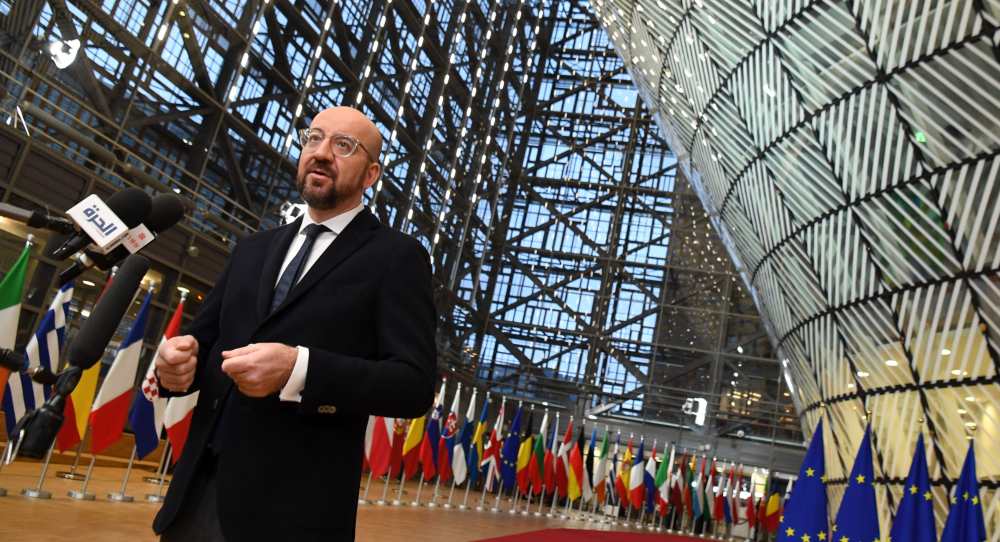“Get Brexit done” was the slogan that UK Prime Minister Boris Johnson and his Conservative party pitched during a short election campaign.
Yes, he won what he wanted: a parliamentary majority. His interlocutors in Brussels and the other EU member states are relieved. Brexit was becoming a distraction for a European Union grappling with several fundamental issues: from enlargement, Russia, and China to the miserable state of transatlantic relations and the assault on multilateral institutions.
Dealing with them will either force the bloc into acting strategically or it will disaggregate, with individual member states such as Hungary and Poland setting their own national agendas.The latter is bad news if the EU is to deal with the ineluctable insidious rise of China and Russia’s constant meddling in Europe’s democratic institutions. That is why much depends on France and Germany getting their relationship back on track.
As it is, French President Emmanuel Macron and German Chancellor Angela Merkel do not see eye-to-eye over three issues: enlargement, Russia, and security.
Germany supports further enlargement. France wants the EU’s internal questions to be settled first. These are about how to further politically and economically integrate the bloc.
The new European Commission President Ursula von der Leyen supports the idea of bringing in the countries of the Western Balkans. This is not going to happen tomorrow. But at least this part of Europe does have a perspective, provided EU countries take seriously the role China and Russia are playing in the region.
Whether it be through investing in the infrastructure or using social media and other propaganda tools, these countries are vulnerable. The region’s very high unemployment rate and corruption are well-known to EU leaders. The longer the delay in tackling these problems, the longer outside players are provided ample opportunity to sow unrest and foster nationalist agendas. This is not good for EU stability.
Enlargement aside, France and Germany are at odds over Russia.
Macron’s hope of resetting relations with the Kremlin plays into the hands of a regime that has long sought to have a security architecture stretching from Lisbon to Vladivostok. That would decouple Europe from NATO.
Merkel is standing firm. Russia invaded and annexed Crimea in 2014 and is waging a proxy war in parts of eastern Ukraine. The Minsk accords, forged by Merkel and the leaders of Russia, Ukraine, and France in early 2015, were, among other things, supposed to provide a timetable for Russia to withdraw its proxy forces from the Donbas region and give Ukraine access to its border. Russia has done neither.
A recent prisoner swap was aimed at creating confidence-building measures between both sides. That’s not enough for Ukraine’s President Volodymyr Zelenskiy to sell to his public.
The point is that there is a simmering war on the EU’s border. So when EU leaders speak and preach about the bloc being a peace project, it just needs to look at how peace does not exist in its big eastern neighbor.
This is why Britain leaves a hole in the bloc. Even though it was not involved in the Minsk process, London has taken a consistently tough line on Russia, particularly after the chemical attack in March 2018, where ex-Russian spy Sergei Skripal and his daughter Yulia were poisoned with Novichok in the Wiltshire city of Salisbury. Also, it supported further EU enlargement—partly because it believed in it and partly because it would make deeper EU integration more difficult.
Britain also provided that necessary part of the Berlin-London-Paris triangle when it came to supporting more economic competition but also supporting Berlin’s views of taking the EU’s Central and Eastern European members seriously.
In that sense, Brexit does leave a gap. It shifts the center of gravity in Europe toward Berlin—not toward Paris, which some argue—precisely because of how the geographical and geostrategic locations of the UK and Germany currently influence each other.
This brings up the question of Europe’s ability to be a security player in a post-Brexit world.
For all the discussions about the strategic autonomy that Macron supports, Europe is not going to achieve this. Not only because it is dependent on the American security guarantee. Also because the EU is built on a “method,” a process. And by nature, processes are risk-averse.
The consensus-based dialogue process that formed the intellectual corner stone of the original European Coal and Steel Community and was formulated by French economist Jean Monnet was crucial for building trust and peace across Western Europe. But processes by their definition are tedious, with decisions in most cases based on the lowest common denominator.
Given the slow unraveling of the post-1945 era, which was underpinned by a massive American political and economic commitment to Europe and to the establishment of multilateral institutions, depending on the EU’s old processes to deal with today’s major geostrategic shifts is questionable.
Maybe Brexit is the beginning of the end of the process-driven EU that has been steered by France and Germany. If so, Paris and Berlin better have options for dealing with the next decade and the ebbing of the post-1945 era.
Greetings, dear readers! This is the last Strategic Europe blog post of 2019. It has been another extraordinary and unpredictable year in the EU and across the globe. We wish all our friends and colleagues, readers and authors a very happy Christmas and a peaceful New Year. We look forward to welcoming you back on Tuesday, January 7.










